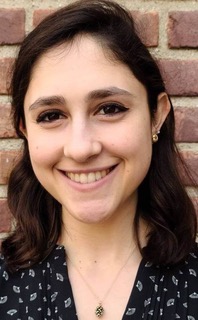
 back to all news
back to all news
Meet the future of Behavior, Education, and Communication: Katie Barr (MS ’22)

Katie Barr (MS ’22) is a recent graduate of the U-M School for Environment and Sustainability (SEAS) specializing in Behavior, Education, and Communication (BEC). Her path to SEAS has taken her from her hometown in Long Island, New York, to her undergraduate education at Barnard College, where she wrote her thesis on farm-to-school and nutrition education programs in New York City elementary schools, to working as a farmer in upstate New York and Columbus, Ohio. Throughout her journey, Barr has expressed a passion for sustainable food and a desire to empower local and regional food systems.

Barr was drawn to SEAS because of the BEC program. “I’ve been a farmer for the past six years,” she said, and while other universities “had great food systems programs, they didn’t get to what I see is the root of systems change, which is understanding how people form values, how they think, and how they make decisions.”
The BEC program has been vital to Barr’s experience at SEAS and the way she shapes her work. “The thing that I was really drawn to most was trying to communicate to others the benefits and the values of reconnecting to the land that we’re working on, to the food that we eat, and to the people who are growing our food,” she said. BEC has enabled Barr to do this. “I’m learning how to communicate with others about forming values and how to enhance people’s perceptions of really important issues, like food sustainability.”
Studying local food systems
During her time at SEAS, Barr has designed a master’s project that reflects her passion for local food systems and behavioral psychology. She studied Argus Farm Stop, a local farm-to-consumer grocery store that operates on consignment, along with five other farm stops that have a similar business model. She aims to understand the ways they are “supporting and generating regional and local food systems through consignment-based retail operations.”
Her project is three-fold. First, Barr created a guidebook on how the “farm stop” model works, and how it can be expanded across more communities. Second, she surveyed the customer bases of the farm stops to see how the community interacts with these businesses. This gets at the “cultural value” of this type of food retailer for communities, and “how these stores can potentially enhance community values around supporting local food systems,” Barr said. Finally, she interviewed more than 40 farmers across the five farm stops to understand what it’s like for them to work with this type of business model.
Barr has high praise for the faculty, including Professor Raymond DeYoung and Professor Avik Basu. “The accessibility of resources through professors has been incredibly useful for me,” she said. “I've developed really strong relationships with a lot of the professors that I’ve worked with, and am grateful for their support.”
What’s next for Barr
She is in the process of developing her next path beyond SEAS. She wants to continue to market the guidebook she’s created and keep expanding on her research. She recently accepted a job at The Common Market, a regional food distributor based in Philadelphia, as a local food systems outreach specialist. In this role, she will be helping to enhance institutional food purchasing by connecting large-scale institutions, such as universities and hospitals, more directly to small-mid-sized farmers and producers. This work will primarily focus on enhancing access to fresh, local food via institutions within marginalized communities along the East Coast. “I want to be able to take the experiences that I've gained through my master’s project and apply them directly to my next career,” she said.
Barr said she is incredibly grateful for her time at SEAS and in the BEC program. “Having the freedom and flexibility to create my own experience has been really wonderful,” she said. “In a nutshell, it’s offered a new perspective, and a new sense of hope and grounding, that we can initiate incredible enhancements in sustainability by supporting communities from the bottom up.”

